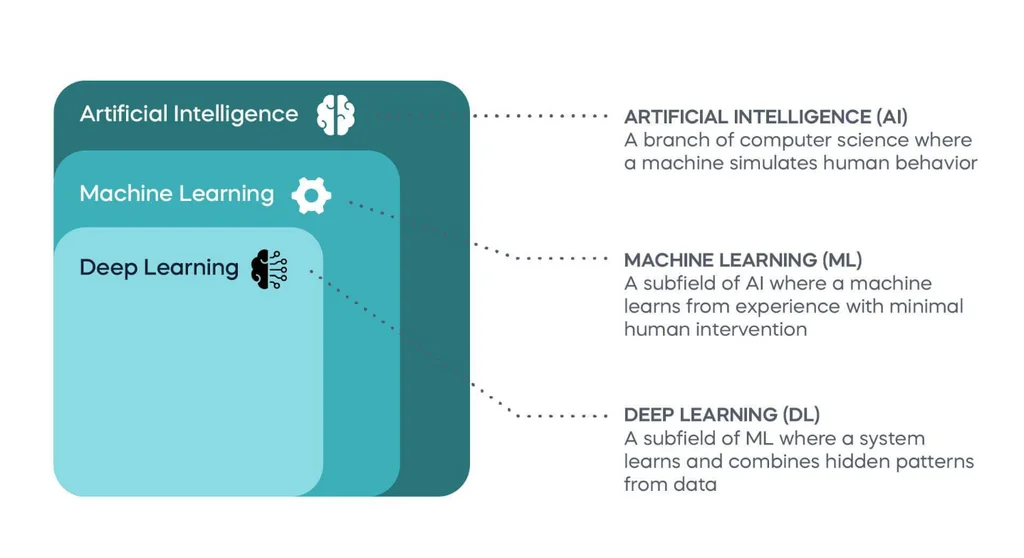Recent technological developments have spurred excitement about opportunities and fear of becoming obsolete. While businesses’ adoption of artificial intelligence has led to the automation of many tasks, new roles continue to emerge daily.
Upskilling is the only way to stay current in this AI-driven world, and those who know how to adapt and leverage new technologies will thrive in the future job market.
But how do you learn AI if you’re starting from scratch? Which skills will survive the test of time and remain relevant in today’s dynamic work environment?
This guide will help you navigate the ocean of information and create a comprehensive learning plan. We'll explore the AI basics, its various types, the in-demand skills, and the essential theory you need to master. We’ll also furnish you with various valuable resources to help you get started.
Table of Contents
- What Is Artificial Intelligence?
- Types of AI
- Artificial Intelligence vs Machine Learning vs Deep Learning
- Applications of Artificial Intelligence
- How is AI Connected to Data Science?
- Why Learn Artificial Intelligence in 2024?
- How Long Does It Take to Learn AI?
- AI Learning Roadmap: How to Learn AI Step by Step
- Top 5 Practical Tips for Learning AI Effectively
- Learn AI-Proof Skills with 365 Data Science
- FAQs
What Is Artificial Intelligence?
Artificial intelligence (AI) involves developing computer systems that simulate human intelligence and can perform tasks like visual perceptions, speech recognition, decision-making, etc. These systems learn from input data and produce human-like output. AI aims to solve complex problems and enhance productivity across different domains.
The primary subfields of AI are machine learning, deep learning, natural language processing (NLP), computer vision, and speech recognition. Technologies like ChatGPT (generative pre-trained transformers) are part of NLP's large language models (LLMs) family.
Types of AI
- Narrow AI (ANI): Narrow AI (or weak AI) specializes in one task. It's the only AI currently existing and applied practically—performing specific tasks like facial recognition.
- General AI (AGI): General AI (or strong AI) can apply knowledge broadly. Unlike Narrow AI, it aims to learn, adapt, and implement information across domains, but technologies like ChatGPT haven't achieved this yet.
- Superintelligent AI (ASI): Superintelligent AI surpasses human intelligence in most cognitive tasks, demonstrating superior problem-solving, learning, and adaptability.
However advanced recent developments may seem, we’re still at the stage of weak AI. Superintelligent AI is just a fictional concept; only time will tell whether we’ll reach that level. Still, we’re closer than ever to AGI. What an exciting time to learn AI!
Artificial Intelligence vs Machine Learning vs Deep Learning
Artificial intelligence involves developing computer systems that mimic human intelligence. Contemporary AI solutions use machine learning (ML) and deep learning (DL) to achieve this.
Machine learning enables computers to learn and improve from data without specific instructions on performing a given task. ML models analyze and extract patterns from large datasets, allowing the system to make predictions or execute several actions with increasing accuracy.
Deep learning is a branch of machine learning inspired by the human brain’s function. DL models represent artificial neural networks that pass information through several layers and generate an output. They outperform simpler ML models at the expense of interpretability. In other words, they are a black box, and we don’t know exactly what happens inside the hidden layers.

Applications of Artificial Intelligence
Artificial Intelligence is already a big part of our daily lives. AI applications span various fields, including healthcare, finance, education, e-commerce, etc.
If you're interested in learning AI, understanding how it could benefit your current work might be helpful. The following are ways in which artificial intelligence is shaping different sectors.
AI in Healthcare
- Predictive models: AI helps predict patient outcomes and diagnose illnesses through predictive models. These models analyze many data points to foresee potential health risks, enabling early interventions. Additionally, with the advancement of AI, it's now possible to predict the spread of infectious diseases and manage public health crises more efficiently.
- Medical imaging: AI studies have contributed significantly to medical imaging, aiding physicians and radiologists in diagnosing various conditions. AI algorithms can analyze the images to highlight potential areas of concern, increasing the accuracy and efficiency of diagnoses. AI in healthcare also detects early signs of diseases such as cancer, thereby improving patient outcomes.
AI in E-commerce
- Personalized recommendations: Artificial intelligence provides precise recommendations to customers based on their search history and preferences. These AI recommendation models enhance the online shopping experience by suggesting products that the customer might find interesting. Additionally, AI predicts future buying patterns, helping businesses better manage their inventory.
- Customer support: AI customer support handles customer inquiries 24/7, significantly enhancing the quality of the service. Chatbots can answer common questions, assist with transactions, and more. They’re programmed to understand natural language—making customer interactions more human-like.
AI in Education
- Personalized learning: Among the educational AI applications are customized services and experiences for students according to their learning objectives. This approach ensures every student receives the necessary attention and support to excel. AI also identifies learning gaps and suggests corrective measures to improve student performance.
- Gamification: AI provides the opportunity for gamification in education. E-learning companies now develop interactive learning games that engage students better in the learning process. Additionally, AI creates adaptive learning pathways, making learning more engaging and effective.
AI in Finance
- Fraud detection: AI algorithms analyze patterns and trends to detect fraudulent transactions. This proactive approach helps prevent theft and ensures the security of financial transactions. AI predicts future frauds based on historical data, further solidifying the security measures.
- Market analysis: AI algorithms analyze historical data to detect market trends, aiding organizations in decision-making. They assist in financial planning and forecasting, driving profitable business decisions. Additionally, AI is applied to make real-time trading decisions in stock markets, leveraging its predictive abilities.
AI in Transportation
- Self-driving vehicles: AI is at the core of self-driving vehicles, handling navigation, traffic management, and collision avoidance. This technology has the potential to revolutionize transportation by making it safer and more efficient. AI also optimizes real-time routes based on traffic data, leading to shorter travel times.
- Ride-sharing services: Companies like Uber and Lyft use predictive analysis to anticipate demand and adjust prices according to distance, time, and destination. AI also matches riders with drivers quickly and efficiently.
AI in Marketing
- Personalization: AI tailors online marketing campaigns to customers, providing a personalized experience that increases engagement and conversion rates. AI automates email marketing campaigns, delivering customized emails to customers based on their behavior and preferences.
- Predictive Analysis: AI helps identify potential customers and optimize ad targeting. It analyzes vast amounts of data to predict customer behavior, assisting businesses reach the right audience at the right time. Moreover, AI predicts future sales trends, helping companies plan their marketing strategies more effectively.
AI in Social Media
- Content Recommendation: AI algorithms analyze user behavior to recommend relevant content, enhancing user engagement. These algorithms are becoming more sophisticated—understanding the nuances of user behavior to make more accurate recommendations.
- Sentiment Analysis: AI uses sentiment analysis to detect trends by analyzing vast amounts of text data. It helps determine public opinion on various topics, providing valuable insights for businesses and researchers. AI also monitors and manages online reputation, assisting companies to respond to customer feedback more effectively.
The wide-ranging AI applications across diverse sectors underscore its pivotal role in shaping the future of our society and economy.
How is AI Connected to Data Science?
Data science is a multidisciplinary field that collects, analyzes, and interprets data to extract insights and inform decisions. Data scientists use data analysis, machine learning, and deep learning to achieve this in their daily work. But while most problems can be solved with data analysis, ML, or DL techniques, some may require the development of AI solutions.
At the same time, knowing when and how to use AI technologies is equally important. Most business settings don’t require a profound knowledge of the mechanics behind AI tools but rather proficiency in using them. In addition, not all problems call for complex solutions—more straightforward approaches are sometimes more effective, cheaper, and easier to implement.
Keep this in mind when you’re learning AI. 365 Data Science helps you acquire the technical skills and business, strategic, and analytical thinking needed to leverage technologies effectively.
Why Learn Artificial Intelligence in 2024?
Industries are already heavily reliant on AI, and the tendency of AI to take over repetitive tasks and advanced data analysis will continue. The sooner you learn artificial intelligence, the better.
Consider the following reasons to start learning AI in 2024:
AI Integration in Data Science
If you wish to become a data scientist, learning AI in 2024 is essential due to its integral role in the field. AI is becoming practically inseparable from data science. AI-driven analytics are now fundamental in key areas like big data processing, predictive modeling, and machine learning. They facilitate enhanced data interpretation and enable more precise forecasts and smarter decision-making—critical for any data-driven role.
Career Opportunities
AI skills are in high demand in the job market. Our research shows that in 2024, 25% of Data Scientist job postings mention 'AI' or 'artificial intelligence,' with 'machine learning' appearing in nearly 70%. Professionals with AI expertise are better positioned to take on high-value roles in tech-driven sectors, ensuring job security and growth opportunities.
Innovation in Automation
AI is pivotal in advancing automation technologies. Mastering AI tools and learning AI programming allows professionals to lead developments in automating routine tasks, thereby increasing operational efficiencies and reducing costs across various industries.
How Long Does It Take to Learn AI?
The time required to study AI varies based on your background and learning intensity. Beginners may better understand AI fundamentals in about six months, while advanced competencies could take up to two years. Consider the following key points.
Continuous Learning
Artificial intelligence evolves constantly, requiring a commitment to ongoing education. Embracing a lifelong learning mindset and staying updated with online AI courses or specialized AI programs is crucial to remaining proficient and adapting to new advancements and methodologies.
Flexible Learning Curve
The AI learning path can be adjusted according to personal or professional demands, allowing learners to pace their studies as needed while progressively building expertise. At 365 Data Science, you can create custom learning paths to meet your personal goals and needs
AI Learning Roadmap: How to Learn AI Step by Step
As a new field, AI is rarely encountered as a standalone university major. Most AI specialists are from related STEM disciplines like data science, computer science, statistics, or mathematics.
If you wish to pursue a more traditional AI learning path, you can obtain a degree in one of these academic fields or look for a dedicated AI program. The requirements may vary depending on your chosen AI career.
Research and scientific roles typically require formal higher education, while applied roles prioritize practical skills and experience. And given its recency and dynamic nature, online AI education and independent learning are common ways to start your career.
So, if you’re wondering how to self-study artificial intelligence but are unsure where to begin, follow these seven steps to learn AI.
Step 1: Build Fundamental Theoretical Knowledge
To understand and apply the complex concepts of artificial intelligence, you need a solid theoretical foundation in mathematics, statistics, and data.
Mathematics
While you don’t need to be a mathematician to learn AI, deep learning and machine learning are based on mathematical principles. So, understanding concepts related to linear algebra and calculus will improve your ability to detect and fix model errors and even develop new algorithms.
Before you frown at the idea of studying calculus, keep in mind that advanced concepts are only needed if you want to create AI algorithms. Using existing algorithms for data science doesn’t require calculus. So, if your goal is to understand and be able to work with AI, having a general idea of mathematical concepts will suffice.
Our Mathematics course will help you start your AI learning journey and build a solid theoretical foundation for your future career.
Statistics
Statistics provides the tools to analyze, interpret, and visualize data, which is crucial for understanding and evaluating the performance of AI models. In addition, many AI techniques are based on such statistical principles as regression, clustering, and classification.
Our Statistics course covers all crucial concepts to help you get started.
Probability
Probability provides a framework for making decisions under uncertainty, which is the basis of AI. AI models estimate and choose the most probable outcome and learn by updating probabilities as new information becomes available. Some algorithms, such as Naïve Bayes, are almost entirely based on probabilistic principles.
Our Probability course provides the fundamental concepts necessary for learning artificial intelligence.
Data-Related Skills
Working with data should be second nature since AI models are trained on it.
- Data collection: Learn essential data collection methods, best practices, and how to use APIs, web scraping tools, and large databases.
- Data cleaning and preprocessing: Real-world data is often messy and incomplete, so you must know how to clean and preprocess it to suit AI models. This could involve handling missing values, removing outliers, or balancing imbalanced data.
- Data wrangling: Sometimes, you need to transform raw data into a different format to facilitate the analysis. You can manipulate and reshape it using Python or R.
Database management: Working with large databases is an inseparable part of the AI process. SQL enables you to handle, query, and manage large datasets efficiently.
Step 2: Learn Programming
Programming is an integral part of an AI specialist’s role. It’s the key to turning theoretical concepts into functional algorithms; without it, you cannot understand, develop, and implement AI models. Although tools like ChatGPT might help you write code faster, you still need to understand programming and learn to code.
Python and R are especially prevalent due to their robust libraries explicitly designed for AI, ML, and DL. So, start by learning R and Python programming fundamentals, then specialize in using frameworks optimized for AI.
NumPy
This popular Python library supports large, multi-dimensional arrays and matrices and offers various high-level mathematical functions to operate on them. Although not an AI library per se, nearly every AI tool uses NumPy.
Pandas
Pandas is ideal for manipulating and analyzing tables with different data types. NumPy and Pandas are the backbones of data manipulation in Python.
Scikit-learn
scikit-learn is a popular ML Python library for data mining and analysis. It supports various supervised and unsupervised learning algorithms.
TensorFlow
TensorFlow is an open-source library developed by Google that is commonly used to build and train deep learning models. It provides multiple levels of abstraction, allowing you to select the right one for your needs.
As one of the most popular deep learning libraries, TensorFlow comes with many guides—making it an ideal starting point for learning to create DL models.
This list of libraries isn’t exhaustive, but it’s a good start when you’re learning how to program AI solutions.
Step 3: Leverage Machine Learning
Nearly all contemporary AI solutions are developed using machine learning. So, understanding key ML concepts is crucial whether you aim for a research or applied role. Your knowledge of math, statistics, probability, programming, and data-related concepts will provide a solid foundation for your ML studies.
You can start with our beginner-friendly Machine Learning in Python course to grasp the logic behind crucial ML methods like linear regression, cluster analysis, logistic regression, and k-means clustering. Then, you can continue with our Machine Learning Algorithms A–Z course to understand the inner workings of more advanced ML algorithms.
But machine learning involves more than just theory; it requires executing the end-to-end ML process—from problem definition to model deployment. In addition, knowing when and how to apply ML in a real-life business context is equally important.
Step 4: Understand Deep Learning
Deep learning is crucial for AI, allowing you to build more advanced models. With the knowledge you’ve acquired, understanding the logic behind deep neural networks will come intuitively. You’ll need to obtain the necessary technical skills and learn the terminology. Our Deep Learning with TensorFlow 2 course is an excellent place to start.
Step 5: Specialize in a Subfield
Once you’ve acquired fundamental AI knowledge, you can select your field of specialization—natural language processing (NLP), large language models (LLMs), computer vision, robotics, building chat applications, etc. There are plenty of jobs in AI, each requiring a slightly different set of skills and qualifications.
Step 6: Attain Soft Skills for AI
Despite its advancements, AI cannot still grasp the nuances of real-life scenarios that demand adaptability, intuition, and strategic thinking. While technology evolves quickly, these essential soft skills will always be valued.
To succeed today, AI professionals must understand the technical aspects, business, and strategic context. They must communicate effectively with various stakeholders, make decisions, and leverage AI to achieve company goals.
At 365 Data Science, we provide all you need to excel in an AI-driven world, including:
- Data Strategy
- Data Literacy
- Communication and Presentation Skills for Analysts and Managers
- Machine Learning Deep Dive: Business Applications and Coding Walkthroughs
- Data-Driven Business Growth
- AI Applications for Business Success
- Product Management for AI & Data Science
Incorporating these soft skills into your technical and programming toolbox equips you for the future workplace.
Step 7: Commit to Lifelong Learning
The AI field is evolving rapidly, so your artificial intelligence training will never be truly complete. You should embrace this reality with curiosity—after all, continuous learning is the only way to stay current and adapt to the dynamic AI landscape.
Take every opportunity to upskill, follow relevant news, read scientific literature, and attend conferences and seminars. Lifelong learning and improvement will make you a better specialist and help you stay updated with recent technological advancements.
The future of machine learning and AI holds exciting new opportunities and uncertainty. The progress made since the early days of AI—from symbolic reasoning to complex deep learning systems—has revolutionized today’s work landscape and sparked the need to acquire new skills.
But there’s still a long way to go before reaching the next stages of AI, where new demands will continue to emerge. By nurturing a lifelong learning and improvement mindset, you position yourself for success. So, we encourage you to embrace emerging technologies and contribute to the ongoing AI revolution.
Top 5 Practical Tips for Learning AI Effectively
Consider the following five tips on how to learn AI the best way and optimize your AI training.
1. Set Clear Learning Goals
Start by outlining specific AI learning outcomes, such as mastering certain models or techniques. This focus will streamline your study efforts and help measure progress.
2. Build Strong AI Foundations
Initial emphasis should be on such core skills as programming in Python and understanding statistical methods. A robust foundation accelerates your ability to tackle advanced AI topics and increases comprehension efficiency.
3. Engage in AI Projects
Hands-on projects reinforce theoretical knowledge and enhance problem-solving skills. Whether optimizing algorithms or applying AI in novel contexts, each project expands your expertise and portfolio.
4. Stay Updated
AI’s fast-paced evolution necessitates staying informed about the latest tools, trends, and research. Engage with leading AI publications and thought leaders to ensure your knowledge remains cutting-edge.
5. Learn AI Collaboratively
Expanding your learning network through community involvement or team projects can expose you to diverse problem-solving approaches and feedback. This exposure is invaluable for broadening your understanding and fostering innovative thinking in AI applications.
Learn AI-Proof Skills with 365 Data Science
Recent AI developments have taken the world by storm. Whether you perceive AI as a disruptive force or an exciting opportunity, its influence is undeniable. And learning how to leverage it is the only way to stay current.
At 365 Data Science, we understand what it takes to succeed in today’s world. That’s why we don't just teach technical data and programming proficiency; we also equip you with the soft skills, business understanding, and strategic and analytical thinking needed to thrive in an AI-driven world.
Sign up and try our program for free.
FAQs







